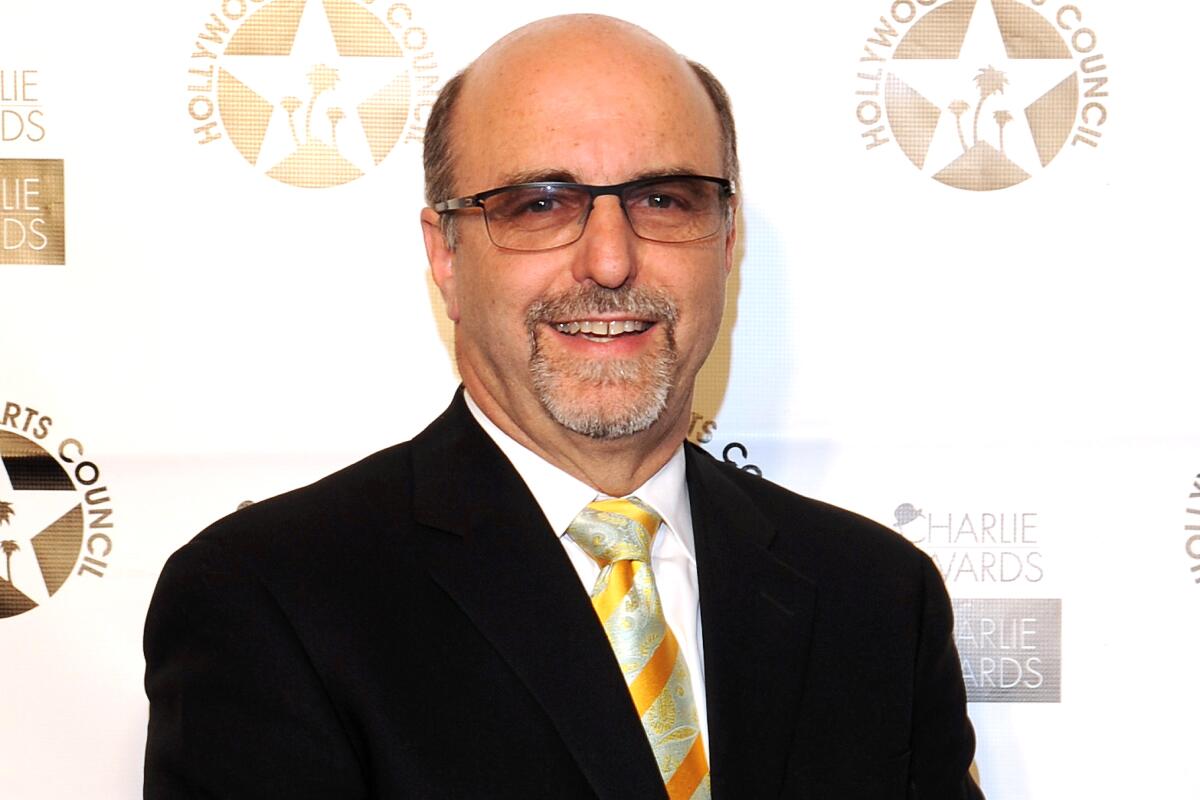Academy member on trial over child molestation charges draws scrutiny

Jeffrey Cooper, a renowned architect and acoustic engineer, carved out a prestigious place in the Hollywood firmament. Over the years he designed movie theaters and sound studios, including an Academy of Television Arts and Sciences theater and more than two dozen of the mixing studios that produced Academy Award nominees for sound, according to the website of his eponymous Calabasas-based firm.
For a galaxy of top directors including Francis Ford Coppola, George Lucas, Martin Scorsese and Steven Spielberg, Cooper was the go-to man to design their home studios. Beyond Hollywood, Cooper was the architect behind the Aish HaTorah World Center in Jerusalem and he proposed the design for a slavery and culture museum in Benin, according to a Medium.com essay he penned in 2020.
In 2002, Cooper became a member of the Academy of Motion Picture Arts and Sciences for his contributions to acoustics and theater design.
However, Cooperâs personal life has taken a turn away from the accolades and praise heaped on him professionally. He has been accused of serious misconduct.
This week his criminal trial for allegedly sexually molesting two minors began in Los Angeles Superior Court in Van Nuys. He faces eight counts, including âoral copulation or sexual penetration with a child 10 years or younger.â Cooper has pled not guilty.
The trial is expected to last three weeks. If convicted on all counts, Cooper is looking at the possibility of life in prison. The case has drawn scrutiny because of Cooperâs continued membership in the film academy, four years after he was arrested.
In June 2018, L.A. County Special Victims Bureau detectives arrested Cooper, then 66, on suspicion of multiple counts of child molestation, according to court records. The acts are alleged to have occurred on one victim between November 2006 and November 2007 and on a second between January 2012 and July 2016, according to the felony complaint for the arrest warrant. At the time of Cooperâs arrest, investigators had identified two female victims.
The alleged victims are now 16 and 28, said Neda Lotfi, a lawyer representing them and their families. Cooper was a friend of one of the girlâs parents and one of their grandparents; they frequented Cooperâs Calabasas home, where the incidents are alleged to have occurred, Lotfi said.
For the record:
2:14 p.m. May 11, 2022An earlier version of this article incorrectly spelled the last name of attorney Neda Lotfi.
âBoth victims have suffered tremendously. They have been stripped of their youth and dignity, and will suffer irreparable harm for the rest of their lives,â Lotfi said. âCooperâs actions were despicable, and justice will be served for these victims.â
Cooperâs attorney, Alan Jackson, vigorously disputed the claims, calling the allegations false.
âDuring the course of this trial you will meet a family with a rich history of falsifying child molestation claims to leverage them for financial gain,â he said in his opening statement, calling his client a âtargetâ because of his âwealth, status and resources.â
Further, he said that the two families were connected and that their allegations were the âproduct of collusionâ and âcollaboration.â
Five months after Cooperâs arrest, the L.A. County district attorney filed for a grand jury indictment against him. The grand jury returned an indictment on all eight counts, according to court filings.
Initially, Cooperâs bail was set at $8.95 million; it later was reduced to $5 million. The court ordered Cooper to surrender both his U.S. and Canadian passports and required him to wear an electronic monitoring device on his ankle; his travel was restricted between his home, work, visits to relatives and place of worship, with a specific list of addresses attached â and a GPS monitor was notified of his visits. Cooper was prohibited from âany unsupervised contact with minors.â
In 2020, the court lifted his ankle monitor, over the objections of the district attorneyâs office, according to a D.A.âs spokesperson.
Last December, just months before Cooperâs trial began and while he remained out on bail, a 23-year-old publicity coordinator said she had an unsettling encounter with him at a pair of screenings for foreign-language films in contention for an Oscar nomination.
The woman, who declined to be named for fear of reprisals, said Cooper introduced himself at the first screening in West Hollywood as Jeff Louis. He was âcharmingâ and âflirtatiousâ during the after-screening dinner, she recalled, boasting that he was the only academy member who was an architect.
But she said the meeting made her âuncomfortable.â Louis, who was nearly 50 years older than she, asked her age and said, âYouâre probably too young.â As they spoke, she said, he touched her legs and arms.
At a brunch in Beverly Hills following the second screening in Beverly Hills, three days later, she said, he insisted they sit together. Once again, she said Louis touched her as they chatted. That evening he texted her photos of them from the event. âGreat to see you again. (Tell me⌠Why do I feel like a naughty school boy who got caught talking to a girl in the back of the class?),â he wrote in a text viewed by The Times.
Unnerved, she googled âJeffrey Louisâ but found nothing. It was only after she went through the eventâs invite list that she found his full name was Jeffrey Cooper. When she searched again, the news articles reporting his arrest on suspicion of child molestation left her rattled. (Louis is Cooperâs middle name, court records show.)
âI was shaking,â she said. âI couldnât work, it was so disturbing to me.â
Her now-former employer said the employee shared details of the alleged event with her.
Cooperâs attorney, Jackson, declined to comment on either the incident or the case.
The academy has struggled to deal with members who have been accused of misconduct.
âThe Academy has been made aware of the alleged abhorrent behavior and will address this matter according to our Standards of Conduct and the due process requirements under California nonprofit corporation law. We would have grounds, under our rules, to expel any member convicted of a violent crime,â the organization said in a statement regarding Cooper.
In 2017, following numerous allegations of sexual misconduct leveled against Harvey Weinstein by the New York Times and the New Yorker, the academyâs board of governors moved quickly to expel the producer. It also enacted a new âStandards of Conduct,â giving the bodyâs leadership flexibility to take action if any member violated the new set of criteria.
A year later, the academy expelled director Roman Polanski and actor Bill Cosby. The decision came 40 years after Oscar winner Polanski fled the United States after he was accused of raping a 13-year-old girl. In 2019, he unsuccessfully sued the academy to overturn its decision and reinstate him.
Cosbyâs ouster came after he was convicted of sexual assault in Pennsylvania and sentenced to three to 10 years in prison. Cosby had been accused of sexual misconduct by dozens of women, going back decades. In 2021, the Pennsylvania Supreme Court overturned the conviction.
More recently, the academy fielded a storm of criticism over its handling of lead actor winner Will Smithâs slap of presenter Chris Rock during last monthâs Oscars ceremony. Almost two weeks later, it announced a ban on Smith for 10 years.
The allegations against Cooper have reverberated in Calabasas, where he lives and works as a longtime active member of the community.
Cooper served on Calabasasâ Architectural Review Panel and was a founder of the Calabasas Shul, an Orthodox synagogue. He is married and has five grown children.
âThis has been a shock to the community,â said James Bozajian, a councilmember and former mayor of the city of Calabasas. Bozajian called Cooper an acquaintance he knew through community matters over the years. Since the arrest, he said, Cooper has largely stayed away from community events.
A graduate of MIT who grew up in Toronto, Cooper devised several innovations, such as the âinfinite baffle speaker wall,â which dramatically amplifies sound into a theater. In 2009, he was recognized by the Rock and Roll Hall of Fame for his work on the Cleveland-based organizationâs 3-D Foster Theater, according to a press release.
When Cooperâs trial began on Monday, prosecutor Jessica Kronstadt said the case is âabout the sex abuse of two girlsâ by a man who was considered a âmentorâ to them and was âbelovedâ by members of his synagogue and community. Cooper was a âtrusted person in their lives and their families,â she said, and he abused them in his homeâs soundproof music studio in âsimilar ways.â
Cooper ânever inappropriately touched anyone,â Jackson told the court. âThe allegations are false, full stop.â
On the first day of the trial, one of the alleged victims, now 28, took the stand. She described Cooper as a âfriendâ and âmentorâ who had known her since she was a child. She testified that she spent time at his house for Shabbat dinners and lunches with her family.
He was someone she could talk to about her interest in music and theater. He taught her to play guitar, and they wrote songs together in his basement music studio. It was there, she said, when she was around 12 or 13 that late one Saturday evening he took advantage of her, molesting her on a couch in the music studio.
Left ânumbâ and unable to speak, she said that Cooper drove her home after the alleged incident and told her, âIâm sorry, I hope we can still be friends.â
Afterward, she said she stopped going to synagogue regularly and did her best to avoid him.
âOver a decade later, this still haunts me,â she told the court. âI should feel empowered but I feel gross. I really try not to think about it. It really knocks me off my feet.â
More to Read
Inside the business of entertainment
The Wide Shot brings you news, analysis and insights on everything from streaming wars to production â and what it all means for the future.
You may occasionally receive promotional content from the Los Angeles Times.










